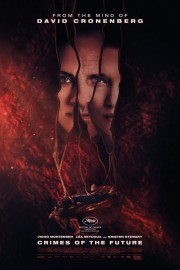Crimes of the Future
“Crimes of the Future” shows a great artist doing what great artists do- taking ideas they worked from earlier in their career, and exploring them in a modern context. Body horror is what most people associate with David Cronenberg, but in his latest film, he dives into a world where it’s more widely accepted, or at least, not a nasty little secret that people don’t really like to talk about. In that way, you can probably find some autobiography in this film from the director of “Scanners” and “The Fly,” especially when we hear what Saul Tenser (Viggo Mortensen) says about other people’s explorations into his artistic wheelhouse. He’s back to show us how it’s done.
The film begins with a son being killed by his mother. We see the son chewing on a plastic trash can, taking chunks out of it as he goes. The mother, after doing to act, calls her estranged husband (Scott Speedman) to collect the body. We see the husband along the edges of the narrative before he talks to Tenser, our main protagonist. Tenser is a performance artist, but his work is very unusual. What his performances show are a level of human evolution that is dark and unsettling. His body is capable of creating new organs- they don’t have a particular function, however; they just grow out of the organic materials his body already contains. In front of an audience, he has them removed by his partner, Caprice (Lea Seydoux, who continues to explore sexual beings in weird, compelling ways), whom tattoos them, and they go on display. There’s something unnervingly sensual about the process for Saul and Caprice; they aren’t strictly lovers, but the intimacy between them is intense. Saul’s condition is part of a larger movement humanity is seeing known as “accelerated evolution syndrome”; one of the side effects is the disappearance of pain. The husband has an unsettling offer for Saul- he wants them to autopsy his son’s corpse in front of an audience. Why? He thinks his son’s body has something to offer the world.
With this new step in humanity, and human creation of biological organs, new laws and entities take hold. One of them is the National Organ Registry. The title says it all, and the agents at the Registry- Wippet (Don McKellar) and Timlin (Kristen Stewart)- hope Saul and Caprice will register his new organs his body creates with him. If you look at movies like “Scanners” and “Videodrome” and “eXistenZ” (it’s been a while since I’ve seen “The Fly”), it’s always fascinating to see how Cronenberg adjusts the world just a touch from reality to adapt to his narratives, and I love how there’s a new bureaucratic body introduced in this film that isn’t far removed from how the world as we know it operates, but is unusual enough to where it adds a layer of drama- and social commentary- to Cronenberg’s narrative. Wippet wants to take what Saul is doing mainstream, whereas Timlin is more personally fascinated by their work. She is aroused by it, even, saying- at one point- “Surgery is the new sex.” If you’re thinking about Cronenberg’s “Crash” reading about this film, you aren’t alone, and this might be the film that finally gets me to revisit and reconsider that one, which was my first Cronenberg, and I was not even remotely prepared for. Even though nothing happens between them, you can feel the erotic pull Saul and Caprice have on Timlin, and Stewart is terrific playing this strange, sexual attraction to what she’s witnessing without making it explicit.
Mortensen could have parlayed the stardom he achieved in the “Lord of the Rings” trilogy into a traditional star career, but- even if I have mixed feelings about some of the films- I love that he started this collaboration with Cronenberg in films like “A History of Violence” and “Eastern Promises” that have allowed him to continue exploring interesting stories and ideas. Tenser might be one of his most intriguing roles for Cronenberg- a man whose body is literally rebelling against living, and can bring discomfort at any time. For his association with dark stories and narratives, if you look at the heart of many of Cronenberg’s films, you get the idea that he’s a filmmaker of tremendous compassion for people whom life has dealt a bad hand to, whether it’s the psychic powers afflicted on Johnny in “The Dead Zone”; the horrible fate of Jeff Goldblum’s scientist in “The Fly”; or Ralph Fiennes’s schizophrenic adult in “Spider.” That’s where Howard Shore- his longtime collaborator- comes in, with a score that is quietly ambitious in sound, but painfully wrenching in emotion. Once again, their respective craft has created something uncomfortable, but powerfully evocative.










